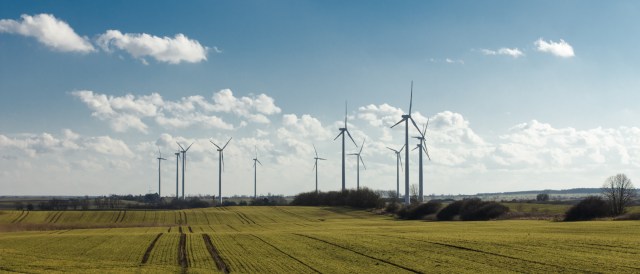Germany consumed 4.7 percent less energy in 2014. Now, the AGEB – the group of economists and utility experts that collate the official statistics – has published its own explanation. By Craig Morris.

Germany’s power productivity increased by 5.3% in 2014. (Photo by Alexander Franke)
We knew the general statistics already, but now have a fuller official analysis. No, not this report at Reuters: “Germany’s primary energy consumption in 2014 was down 4.7 percent from a year earlier due to mild weather and a slowdown in the economy, industry statistics group AGEB said on Tuesday.” The actual AGEB publication (PDF in German) does not attribute the reduction to any economic slowdown. Instead, on page 33, the AGEB speaks of a 5.3 percent increase in electricity productivity resulting from “a clear decrease in power consumption along with good economic growth.” The average increase in power productivity was 1.2 percent annually from 1990 to 2014.
The introduction itself is entitled “Strong downturn in energy consumption thanks to mild weather.” The paper explains on page 2 that “energy consumption would have been around one percent below the level of the previous year without this weather effect.” 2014 was the warmest year in Germany since measurements began in 1881.
The next sentence is all the more interesting in terms of Reuters’ reading: “According to preliminary calculations by the German Office of Statistics, the economy grew by 1.6 percent after adjustments for inflation. This macroeconomic growth would normally increase consumption, but the effects remained limited.” Overall, energy productivity (not just electricity) increased by “nearly 3 percent.” Keep in mind that 1.6 percent economic growth was slightly above the EU-28 average of 1.3 percent growth last year – and substantially better than the 0.8 percent growth in the euro area.
I previously speculated whether the reduction in power consumption might partly be the result of more direct consumption of renewable electricity, but the AGEB clearly says that its figures for photovoltaics, for instance, include on-site consumption (regardless of whether feed-in tariffs are paid or not).
One indicator, however, suggests that there may be an economic effect from lower industry production. The chemicals sector shrank by nearly 7 percent last year, and it is the second biggest consumer of energy after metal production – and first for power consumption. However, power prices for energy-intensive industry have been dropping, not rising, in the past few years. In particular, the largest chemicals firm in Germany, BASF, generates all of its own electricity; it does not buy any from the grid. An investigation of the global chemical sector might reveal a particular effect on German chemical producers aside from BASF. Overall, industry power prices increased “slightly by one percent” last year, as the AGEB explains.
A closer view by energy source reveals the temperature effects. Consumption of heating oil dropped by 13.6 percent, whereas diesel and gasoline consumption (used in vehicles, not heating systems) were actually up by around four and two percent, respectively. Indeed, while everyone continues to focus on coal, “petroleum remained the largest energy source in 2014 at just over a third of consumption.” (Brace yourself for a further increase in gasoline and diesel consumption this year due to lower prices.)
Even adjusted for the temperature effect, carbon emissions were down by “around 1.5 to 2 percent.” The problem is that Germany needs to reduce carbon emissions annually by 3.3 percent on average to reach its 40 percent reduction target from now until 2020.
The share of renewable energy itself is also going nowhere when measured in terms of total energy consumption. Significant progress continues to be made in the power sector, where the share of renewables has grown by around two percentage points annually in the past few years. In contrast, the share of renewables in all energy consumption (power, heat, and transport) grew from 10.5 to 11.1 percent year-over-year in 2014. That year was not an outlier either; in 2000, Germany got 2.9 percent of its energy from renewables, so the country has only increased that share by 8.2 percent in 14 years.
Germany has a target of 60 percent renewable energy by 2050, but at a growth rate of 0.6 percentage points per year (as in 2014), that target will not be reached in mid-century, but at the end – in 2097.
Craig Morris (@PPchef) is the lead author of German Energy Transition. He directs Petite Planète and writes every workday for Renewables International.